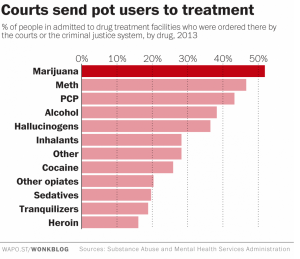Your daily ration of civil justice rationing
National Radio Program Offers View Of Former Immigration Judge
Court-Referred MJ Treatment: Court and Treatment Backlog

As reported in the Washington Post on 12/14/15, “In 2013, more than half of marijuana users in treatment were sent there by the courts or the criminal justice system. That’s more than the share of court-ordered referrals for any other drug, including far more deadly ones like alcohol and heroin.”
Project SAM (Smart Approaches to Marijuana) has long cited increases in people seeking treatment for marijuana as a core reason to keep prohibition.
However, the WaPost reports this week that DHHS has come out with some context for those sharp increases. ” In 2013, more than half of marijuana users in treatment were sent there by the courts or the criminal justice system. That’s more than the share of court-ordered referrals for any other drug, including far more deadly ones like alcohol and heroin.”
This confirms a 2007 report from Jonathan Gettman, PhD report that showed, “56.7% of [2005] treatment referrals for marijuana were generated by the criminal justice system.”
The Post continues that, “Overall, fewer than 1 in 5 marijuana treatment seekers checked themselves in voluntarily. That too is a lower share than for any other drug.”
We often note how otherwise minor court cases can create a backlog for more important cases involving housing and child custody. A similar question could be posed here in these cannabis cases, but as the Post notes, it can also be translated to key treatment questions.
“The HHS data shows that marijuana users accounted for more than a quarter of all drug treatment admissions in 2013, which means that court-ordered marijuana treatment is taking up more than 1 out of every 10 beds in the nation’s drug treatment facilities — at a time when prescription painkillers and heroin are killing record numbers of Americans. “
Court Access Raised As Issue In Florida’s Daubert-Frye Row

According to a 12/14/15 Jacksonville Daily Record article, “It will be up to the Florida Supreme Court next spring to determine which evidentiary path to follow.
Jacksonville attorney Wayne Hogan believes in the current path, the Frye standard. The decision, he said, could influence how juries end up hearing cases and deciding verdicts.”
The Daily Record in Jacksonville, Florida is quoting local attorney Wayne Hogan in a report about how expert witnesses will be qualified for Sunshine State cases, and he’s raising the issue of access to justice: “At a time when the Bar is focused on the importance of access to justice,” said Hogan, “the proposal for change runs just in the opposite direction.”
Read more here.

